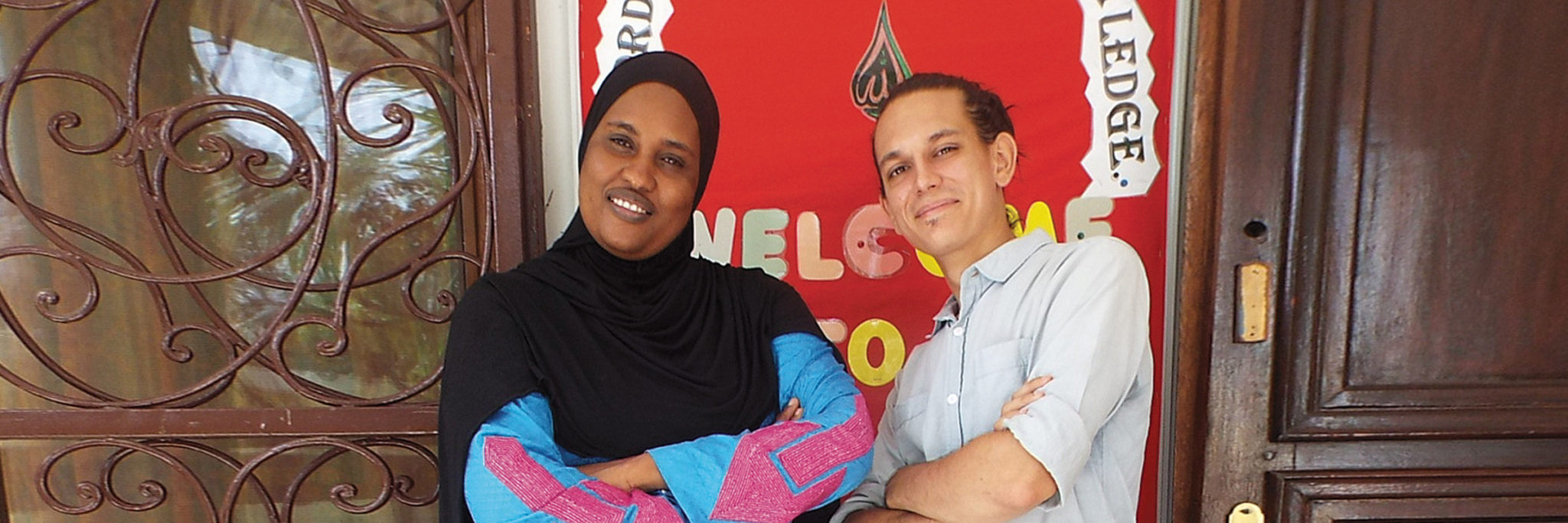After graduating from Denison, James Courtright ’12 joined the Peace Corps in Senegal, West Africa. He stayed on in Senegal after his service ended and now works as a freelance journalist in the capital, Dakar. Fanta Diamanka, a former Denison professor, is now the founder and directress of the Noor International Academy (NIA), a bilingual primary school in the suburbs of Dakar. Courtright first met Diamanka when she was his women’s studies professor at Denison. Through a mix of shared interests and aspirations—and a little luck—their lives have crossed paths multiple times since Denison, including a stint during which Courtright worked with Diamanka at the Noor Academy. The pair recently sat down together to talk about the coincidences and mutual mentorship that brought them together so far away from the Hill.
Courtright: How did you get interested in education?
Diamanka: My dad was a teacher here in Senegal for 40 years. He inspired me to be a teacher, but I couldn’t articulate it early on. I am wired for science, but I always taught too. While I was at university, my dad retired suddenly. I am the first of nine children, and I felt like I had to provide for my family. I started teaching for the Peace Corps to make money, and it was amazing. The Peace Corps allowed me to look at issues from a different perspective. Then I decided that I wanted to work in education and that I wanted to work with women.
Courtright: I was a junior when I took your issues in feminism class at Denison. You always presented us with multiple opinions and encouraged us to make up our own minds. I don’t think we ever ended class all on the same page, but you always fostered an environment of mutual respect and civility.
Diamanka: That class was very gratifying, because I could see where students were at the beginning of the class, and where they ended up. I could see the learning curve. I remember you because of the way you articulated your ideas.
Courtright: I remember staying after class for one-on-one discussions. But unfortunately, after I graduated in 2012, we fell out of touch. I applied to the Peace Corps and was accepted for a position in Senegal. I’m still annoyed I didn’t contact you then, especially when I was sent to Kolda. At the end of my third year in Kolda, I noticed an advertisement on Facebook for a teaching position in Dakar. I was intrigued and clicked the link. It was for Noor Academy, the school you founded.
Diamanka: Yes. You know, I never went to the U.S. with the intention of staying. Coming back and founding Noor International Academy was a lifelong dream. Noor wants to train well-rounded young intellectuals both spiritually and academically. In Senegal you have the daaras that take care of the Qur’an and then you have the schools that take care of academics. What we are trying to do here is take the best of all systems. They are not mutually exclusive. Like Fallou in 4th grade—he wants to be an imam-astronaut. He wants to do the call to prayer on Mars. Those are the type of young minds we want to mold.
Courtright: After reading about Noor, I realized it was your school. I found you on Facebook and an hour later we were on the phone.
Diamanka: I always envisioned you abroad doing some type of international development. But there’s some real coincidence there. Denison, then Peace Corps, then Senegal, and then Kolda. The world is small.
Courtright: I was so happy when we reconnected when I moved back to Senegal this year. You’ve helped me with interviews about feminism, Islam, and West Africa for my podcast series.
Diamanka: And you’ve been helping with the website and social media for the Noor Academy.
Courtright: It’s just really inspiring to see what you’re doing here. To see you shape the minds of young Senegalese—in the same way you shaped the minds of so many Denisonians—makes me optimistic about the future.

